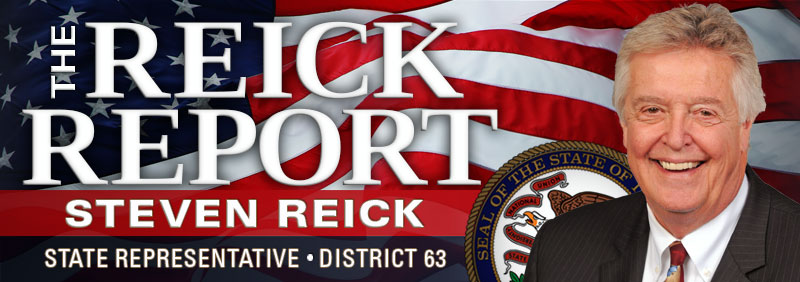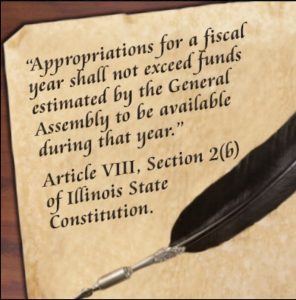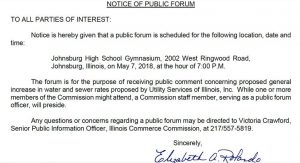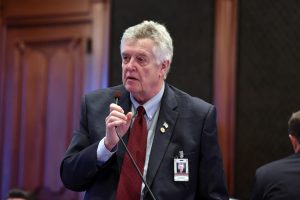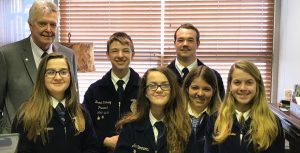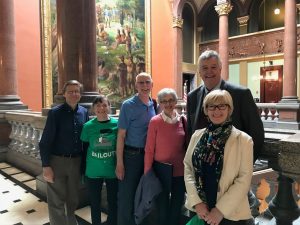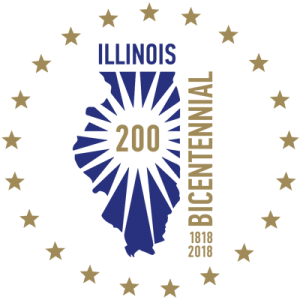The House and Senate by joint resolution shall adopt or modify such estimates as may be appropriate. The joint resolution shall constitute the General Assembly’s estimate, under paragraph B of Section 2 of Article VIII of the Constitution, of funds estimated to be available during the next fiscal year (25 ILCS 155/4(a))
Appropriations for a fiscal year shall not exceed funds estimated by the General Assembly to be available during that year.
ICC to Host Local Hearing on Proposed Utilities, Inc. Rate Hike
The current rate hike, if implemented, would be the third rate increase for water and sewer since 2009 for these people. The constituents who contacted me, many of whom are living on fixed incomes, asked me to help facilitate a local platform where they can come and provide testimony on how this latest rate increase would affect their family budgets, and for some, their ability to remain in their homes.
In 2009, Utilities Inc. serviced the affected area at a monthly rate of $5.14 and consumption rates of $3.14 per 1,000 gallons. If the latest request is approved by the ICC, those customers would soon have to pay a rate of $35.03 per month with consumption rates of $11.08 per 1,000 gallons; a 353% increase in water/sewer service costs in just eight years. Considering the Consumer Price Index has only risen 13 percent since 2009, increasing rates by more than 350 percent for a necessity like water is extreme. We have offered to help coordinate the meeting. To read our joint letter to the ICC, click here.
Representative Steve Reick Serves as Leading Republican Voice on Bill to Allow Emergency Firearms Restraining Orders
There’s a mental health component of these violent crimes that cannot be ignored. Rather than passing legislation that infringes upon the constitutional rights of lawful gun owners, we need to turn our attention toward mental health issues that allow some people to use their firearms to harm others. Click here to read more about the details of this bill.
Representative Steve Reick Helps Lead Legislative Effort to End Illinois Teacher and Substitute Teacher Shortage
My office has been working with a retired teacher from Woodstock who was named one of the top ten educators in the state during his tenure. This individual has found the process to become a substitute teacher to be tedious and extremely expensive. Today Illinois faces a serious teacher and substitute teacher shortage, and this year I am serving as a Chief Co-Sponsor of legislation that aims to address this growing problem.
HB 5627, which received unanimous approval in the Illinois House last week, includes several provisions that seek to relieve the teacher and substitute teacher shortage in Illinois by making it easier for educators coming into Illinois from other states to obtain licensure and restructuring substitute teacher licensure requirements. HB 5627 would provide for the following:
- Full reciprocity of out-of-state applicants for an Illinois Professional Educator License, which would allow out-of-state licensed educators to teach in Illinois without meeting additional requirements
- Makes numerous changes to the Substitute Teaching License law to ease the process for out-of-state licensed teachers and retired teachers with lapsed licenses to work as substitute teachers
- Eases requirements for the timing of completion of professional development
- Retired educators could work in school districts through June 30, 2020 a total of 120 paid days or 600 paid hours each school year without infringing on earned pension benefits
- A short-term substitute teaching license would be established for individuals who hold an associate’s degree or have earned at least 60 hours toward a degree from an accredited institution of higher education
These are excellent changes that should ease the process for those who would like to teach in Illinois schools. The standards remain high for the caliber of individual we would entrust to our public school classrooms, but much of the red tape and expense is removed. The bill has now moved to the Senate for consideration.
Rep. Reick Champions Legislation to Ensure Fair Maps in IL
HJRCA 46 would provide for the creation of an independent legislative redistricting commission, which would lead a detailed review process of maps submitted by any Illinoisan who would wish to suggest a map. The commission, appointed equally by the four legislative leaders from the Republican and Democratic caucuses, would provide the public with necessary data and tools with which to create map proposals. A multi-faceted scoring rubric would be used to rank all submissions with higher scores generated by maps that keep municipalities and counties together and which are compact in nature. The three highest-scoring maps would be brought to the House and Senate, where a three-fifths majority vote would be required for passage of one of the three maps. In the event that consensus is not reached, the highest-scoring map would be certified by the Secretary of State and become law.
This legislative solution takes political influence out of the equation and allows citizens and the commission to drive the process. Most importantly, HJRCA 46 takes into account previous fair maps proposals that have been deemed unconstitutional by the courts, and addresses those specific points in a manner that should withstand a court challenge. HJRCA 46 retains and repurposes the current constitutional participants in the mapping process (redistricting commission, General Assembly, Secretary of State) in order to conform with Illinois court decisions about citizen-led map initiatives.
In addition to HJRCA 46, I’m also co-sponsoring HR 995, which expresses support for independent redistricting reform and advocates for a non-partisan map-making process for the upcoming redistricting cycle. Both proposals would apply to redistricting beginning in 2021 for the elections to be held in 2022. I have posted an online petition for those who oppose gerrymandered legislative maps and support a fair maps process, and would encourage all residents to sign it.
Reick Welcomes Local Residents to Springfield for Lobby Days
The grant money will be paid through the Illinois Department of Human Services (IDHS) to medical service providers who help fight opioid abuse and provide treatments States hit by opioid abuse are getting help from Congress through the 21st Century Cures Act.
The abuse of opioid drugs, including heroin and fentanyl, played a role in the deaths of an estimated 2,000 Illinois residents in 2017. Much of the grant money is earmarked for new treatment and recovery services, including medication-assisted treatment. Medication-assisted treatments for opioids include limited allocations to patients of medications that reduce withdrawal symptoms, such as methadone and buprenorphine. Persons recently released from prison or county jail, who are diagnosed as being at risk for recidivism, will be offered treatment options. Some of the grant money will be used to strengthen enforcement of the Illinois Prescription Monitoring Program, the State program to monitor and enforce the prescription status of opioid painkillers.
The grant will supplement efforts already underway to make universal the first responder access to naloxone, the opioid agonist that if administered in a timely manner can save the life of a victim who is in an overdose situation. In its ongoing outreach to paramedic forces and other first responders, IDHS has learned that funds like these have trained nearly 18,000 responders to administer naloxone.
Veterans to be Honored
Participants in the Illinois Bicentennial’s Top 200 survey were asked to pick their favorite building in Illinois, and the winning choice was Wrigley Field, the century-old Major League Baseball park that became the home of the Chicago Cubs in 1916. After many generations of mixed results, the storied Friendly Confines became the home of the 2016 World Series Champion Chicago Cubs. Other Illinois buildings were also supported by survey participants. Coming in second was a building owned by the people of Illinois, Springfield’s Dana-Thomas House, which contains artistic motifs that celebrate Illinois’s ecology and landscapes, and is fitted with more than 100 pieces of Wright-designed furniture, lights, and art glass. The Wilmette Baha’i Temple, Chicago’s Willis (formerly Sears) Tower, and Chicago’s Robie House were honored with selection slots #3 through #5.
